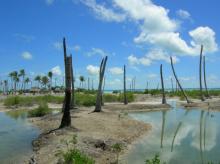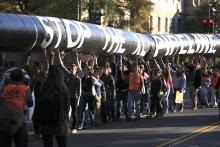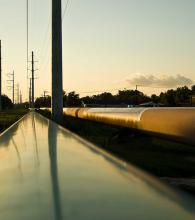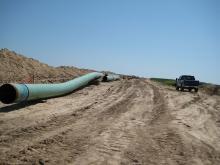Corporations want to store up treasure on earth — that's their whole, entire, complete, and utter point.
Creation Care
Forests throughout North America would not be the same today without the trailblazing work of a small Mohawk Catholic community in Quebec.

Today is World Water Day – an opportunity to celebrate the amazing H20 that we have the privilege to enjoy every day. It is also a day to remember and campaign on behalf of the 780 million people who lack access to clean water across the globe, and the 2.5 billion without access to a basic toilet.
Here are some of the best World Water Day links from around the world:
World Vision offers an inspiring story of how life-changing access to clean water can be for people in the developing world.
UK-based Christian international development organization Tearfund have worked on issues of water and sanitation for many years and offer their thoughts on why today is an important day for all of us.

There may be those in the public sphere who dismiss climate change as a ‘hoax’ — doing so is good politics in some spheres — but the people of the small island nation of Kiribati do not have the luxury of debating whether climate change is real.
It is. And it's threatening the very existence of their nation.

Last week, 56 senators voted to include the Keystone XL Pipeline in a highway bill — four short of the required 60.
The vote proved that ordinary people still can make a difference. Months of action, hundreds of thousands of messages and phone calls, and stalwart determination made the difference in those four votes. And I think it shows that people are looking for a different paradigm of environmental stewardship.
In the wake of last year's Fukushima disaster, German chancellor Angela Merkel announced the country would phase out nuclear power. Churches are at the forefront of Germany's new solar revolution.
The U.N. climate change talks in South Africa were a major disappointment -- but the struggle continues.
“Life, especially protecting our unborn children and infants, should not be a ‘matter of party or economic commodity.’ Protecting life and providing the opportunity for abundant life must be a matter of principal and morality.” – The Rev. Mitch Hescox, delivering a testimony on “A Christian Perspective on the Costs of Mercury to Human Health and Wellbeing” before the Energy and Power Subcommittee for the House of Representatives.
The House Energy and Commerce Committee approved legislation Tuesday that would reverse President Obama’s rejection of the Keystone XL oil sands pipeline.
While the mid-Atlantic basks in higher than normal temperatures, it isn’t like that everywhere. Two stories from The New York Times on the struggle for warmth.
In Maine, elderly and often disabled folks who can’t afford heating oil struggle for warmth. The energy assistance program of past years was slashed as part of federal spending cuts, resulting in 65,000 households in this state alone receiving less help, while the cost of oil has risen more than 40 cents a gallon. The basic need for heat becomes a full-time struggle.

I know why those polar bears you're seeing everywhere look so pensive. They're thinking not just about coke (a byproduct of coal used in industry), but more generally about the massive use of dirty coal — used to make nearly half of all U.S. electricity (while renewable sources account for only about a tenth).
They're thinking about how the U.S. and the rest of the world's decades of reckless fossil fuel use keep ratcheting up greenhouse gasses in the atmosphere, causing Arctic ice to melt even faster than expected, and threatening them and all their polar bear friends. They'd like a cold one, all right — a cold Arctic, the way their home should be.

There are a lot of heinously unmerited personal attacks going on in these United States right now, but for some reason I’m most bothered by the ones against Dr. Katharine Hayhoe, a climate scientist and evangelical Christian. As this current Sojourners action alert describes, she’s been targeted by Rush Limbaugh, among others, for her efforts to speak the truth about global warming.
Partly, these attacks get under my skin because I’ve always had a soft spot in my heart for evangelical scientists. My dad is one, and my Intervarsity-linked Bible study in grad school was so full of them that, as often the lone humanities student, I jokingly made up a scientific discipline to fit in (“I’m in immunostatistics — I model atypical populations.”)
But mostly, the attacks on Hayhoe sadden me because she’s so genuine and earnest in her desire not just to convey the evidence for climate change, but also to engage in respectful dialogue.
There are many things they seemed to hold in common, not least an instinctive nonviolence, contrasting so sharply with the police, who so often let the logic of force drive their actions (they found out, as often in history, that the logic that works with criminals doesn’t really apply to idealists).

Late Wedesday (1/18), leaders from Christian and other faith communities welcomed the news that the Obama administration has rejected the construction of the Keystone XL pipeline.
The controversial project, which would have run for 1,700 miles from Alberta, Canada, through the American Heartland to the Gulf of Mexico, would have been a backward step in the administration’s professed commitment to investing in clean and renewable energy sources.
In August 2011, more than 1,200 peaceful protestors were arrested as part of a sustained campaign to demonstrate against the pipeline project. In November 2011, Sojourners CEO Jim Wallis, along with other Sojourners staffers and 15,000 members of the public, peacefully (and prayerfully) encircled the White House to urge President Obama to stop the project.
Sojourners welcomed the Obama’s decision in November to postpone the permitting of the pipeline until an environmental impact report was completed. While this new decision is a clear step forward, TransCanada has the opportunity to reapply for the permit along a different route and leaders have pledged to remain vigilant and watch the issue closely.

The building of a 1,700-mile pipeline through the heartland of the United States has been at the center of the debate on the economy for many months now. Much has been written by those who both support and oppose its construction. And much has also been written about just how important the pipeline would be to the U.S. economy if it were actually to be built.
With the deadline for the Obama administration’s decision on construction coming up fast (2/21), many have already made up their minds. But have they done so on the basis of accurate figures?
It might be pretty difficult to do so, given that various estimates put the number of jobs created though the construction of the pipeline at anywhere between 20 and 350,000. So where have all these different estimates come from, and which one (if any) is actually accurate?
The first difficulty that arises from trying to find an accurate estimate is that most of the numbers from the upper echelons of the estimates come from the company who are hoping to build the pipeline: TransCanada.

The legacy of Martin Luther King, Jr., and the reality of climate change are both victims of western culture’s remarkable capacity to accommodate and neutralize that which is most critical of it.
Early in the civil rights movement, Bayard Rustin said to King, “I have a feeling that the Lord had laid his hand upon you. And that is a dangerous, dangerous thing.” Similarly, the FBI once described Martin King as the “most dangerous man in America” – and yet, as Martin Luther King Jr day rolls around again in the United States, we are often presented with a figure that seems more like a cheerleader for the status quo rather than a prophetic challenge to it. Somehow, it seems we have made this dangerous figure very safe.
For instance, in a speech at the Pentagon commemorating King’s legacy, the Defense Department’s general counsel Jeh C. Johnson remarked, “I believe that if Dr King were alive today, he would recognize that we live in a complicated world, and that our nation’s military should not and cannot lay down its arms and leave the American people vulnerable to terrorist attack.”
But to claim that Dr King would be pro-war today is as likely as him being pro-segregation. After all, this is the Dr King who said, “A nation that continues year after year to spend more money on military defence than on programs of social uplift is approaching spiritual death.” And this is the same Dr King who said in his speech on 4 April 1967 (a speech that turned three quarters of American public opinion against him), “To me the relationship of the ministry [of Jesus Christ] to the making of peace is so obvious that I sometimes marvel at those who ask me why I’m speaking against the war.” And this is the same Dr King who said, the night before he was murdered on 4 April 1968, “It is no longer a choice, my friends, between violence and nonviolence. It is either nonviolence or nonexistence.”

Climate change affects the poorest the hardest. Most things do. In the parts of the world where climate change is most prevalent, it is those who have done the least to cause it that are bearing the brunt of its effects.
It is the Malawian farmer whose crops have failed because the seasonal rains didn’t start at the usual time. It’s a Bangladeshi who can see the sea-levels rising around her town year after year, and has nowhere to go. It’s even an American family whose food bill grows ever larger because of the stresses that a changing climate is having on food security worldwide.
These are neither the people nor the organizations that have spent decades turning a blind eye to their responsibility as good stewards of our environment. They are not the people who, in the face of more and more extreme weather patterns, turn an issue of human survival into an ideological war.
It is for them that we must adapt.

12. Do something really nice – that no one knows about.
11. Spend more money on other people than I spend on myself. Love my neighbor as I love myself. And love myself as I love my neighbor.
10. Laugh often… especially at advertisements that try to convince me that I must buy more stuff in order to be happy.
"I think it is a spiritual task to struggle with questions such as what and who we place at the center of our economy"

After years of opposition from coal industry lobbyists, the Environmental Protection Agency has issued the first national standards for mercury and air toxin pollution.
The standards will slash emissions of these dangerous pollutants by relying on widely available, proven pollution controls that are already in use at more than half of the nation’s coal-fired power plants.
The EPA estimates that the new safeguards will prevent as many as 11,000 premature deaths and 4,700 heart attacks each year. The standards also will help America’s children grow up healthier — preventing 130,000 cases of childhood asthma and about 6,300 fewer cases of acute bronchitis among children each year.